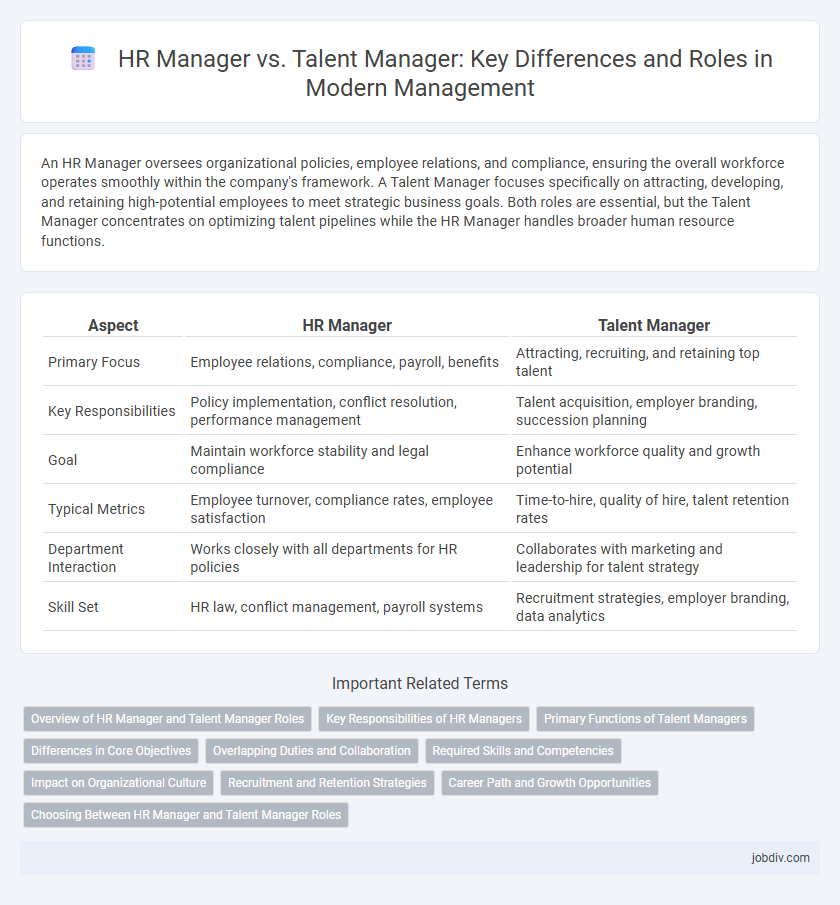An HR Manager oversees organizational policies, employee relations, and compliance, ensuring the overall workforce operates smoothly within the company's framework. A Talent Manager focuses specifically on attracting, developing, and retaining high-potential employees to meet strategic business goals. Both roles are essential, but the Talent Manager concentrates on optimizing talent pipelines while the HR Manager handles broader human resource functions.
Table of Comparison
| Aspect | HR Manager | Talent Manager |
|---|---|---|
| Primary Focus | Employee relations, compliance, payroll, benefits | Attracting, recruiting, and retaining top talent |
| Key Responsibilities | Policy implementation, conflict resolution, performance management | Talent acquisition, employer branding, succession planning |
| Goal | Maintain workforce stability and legal compliance | Enhance workforce quality and growth potential |
| Typical Metrics | Employee turnover, compliance rates, employee satisfaction | Time-to-hire, quality of hire, talent retention rates |
| Department Interaction | Works closely with all departments for HR policies | Collaborates with marketing and leadership for talent strategy |
| Skill Set | HR law, conflict management, payroll systems | Recruitment strategies, employer branding, data analytics |
Overview of HR Manager and Talent Manager Roles
HR Managers oversee comprehensive employee lifecycle management, including recruitment, compliance, payroll, and employee relations, ensuring organizational policies align with labor laws and company goals. Talent Managers specialize in identifying, attracting, and retaining high-potential candidates through targeted talent acquisition strategies and career development programs. Both roles drive workforce optimization but differ in scope, with HR Managers handling broader administrative functions and Talent Managers focusing on strategic talent growth and retention.
Key Responsibilities of HR Managers
HR Managers oversee employee relations, performance management, and compliance with labor laws, ensuring organizational policies align with regulatory standards. They manage recruitment processes, compensation and benefits administration, and employee development programs to foster workforce productivity. HR Managers also handle conflict resolution, training initiatives, and strategic planning to support overall organizational goals.
Primary Functions of Talent Managers
Talent Managers specialize in identifying, attracting, and nurturing high-potential candidates to align workforce capabilities with organizational goals. They focus on strategic workforce planning, succession management, and employee development programs to enhance retention and performance. Unlike HR Managers, Talent Managers prioritize the continuous optimization of talent pipelines and leadership cultivation within the company.
Differences in Core Objectives
An HR Manager primarily focuses on employee relations, compliance, payroll, and organizational policies to ensure smooth day-to-day operations within the company. A Talent Manager concentrates on attracting, developing, and retaining top talent by aligning recruitment strategies with long-term business goals. While HR Managers manage overall workforce administration, Talent Managers specialize in optimizing human capital to drive innovation and competitive advantage.
Overlapping Duties and Collaboration
HR Managers and Talent Managers share overlapping duties such as workforce planning, employee engagement, and performance management, ensuring alignment between organizational goals and talent development. Collaboration between the two roles enhances recruitment strategies, streamlines onboarding processes, and fosters employee retention by integrating HR policies with targeted talent acquisition efforts. Effective communication and coordinated talent analytics drive a unified approach to managing human capital and optimizing workforce potential.
Required Skills and Competencies
HR Managers require strong organizational skills, proficiency in labor laws, employee relations, and strategic planning to manage overall workforce administration effectively. Talent Managers focus on competencies such as talent acquisition, candidate evaluation, employer branding, and employee development to align recruitment with company growth goals. Both roles demand excellent communication, problem-solving abilities, and a deep understanding of human capital management systems.
Impact on Organizational Culture
HR Managers shape organizational culture by establishing comprehensive policies that promote inclusivity, compliance, and employee well-being, ensuring a stable and ethical work environment. Talent Managers influence culture through strategic recruitment and development, nurturing a high-performance atmosphere aligned with company values and innovation goals. Both roles collaboratively enhance organizational culture, balancing regulatory frameworks with dynamic talent growth to drive overall engagement and productivity.
Recruitment and Retention Strategies
HR Managers design comprehensive recruitment frameworks that align with organizational goals, ensuring a steady pipeline of qualified candidates. Talent Managers concentrate on identifying high-potential individuals and developing personalized retention strategies to enhance employee engagement and reduce turnover. Both roles utilize data-driven approaches to optimize hiring processes and foster long-term workforce stability.
Career Path and Growth Opportunities
HR Managers typically oversee broad organizational functions such as employee relations, compliance, and payroll, providing a stable career path with opportunities to advance into senior HR or operational leadership roles. Talent Managers focus on recruitment, employee development, and retention strategies, often progressing toward specialized roles in talent acquisition, learning and development, or strategic workforce planning. Career growth for HR Managers is generally hierarchical and functionally diverse, while Talent Managers experience growth through expertise in talent management and influencing company culture.
Choosing Between HR Manager and Talent Manager Roles
Choosing between an HR Manager and a Talent Manager role depends on organizational priorities like employee administration versus talent acquisition and development. HR Managers focus on labor law compliance, policy implementation, and employee relations, while Talent Managers specialize in sourcing, onboarding, and nurturing high-potential employees. Companies aiming for strategic workforce planning often prioritize Talent Managers to enhance competitive advantage and retention.
HR Manager vs Talent Manager Infographic

 jobdiv.com
jobdiv.com